A Bridge Between the Hearing and the Deaf Tokyo 2025 Deaflympics
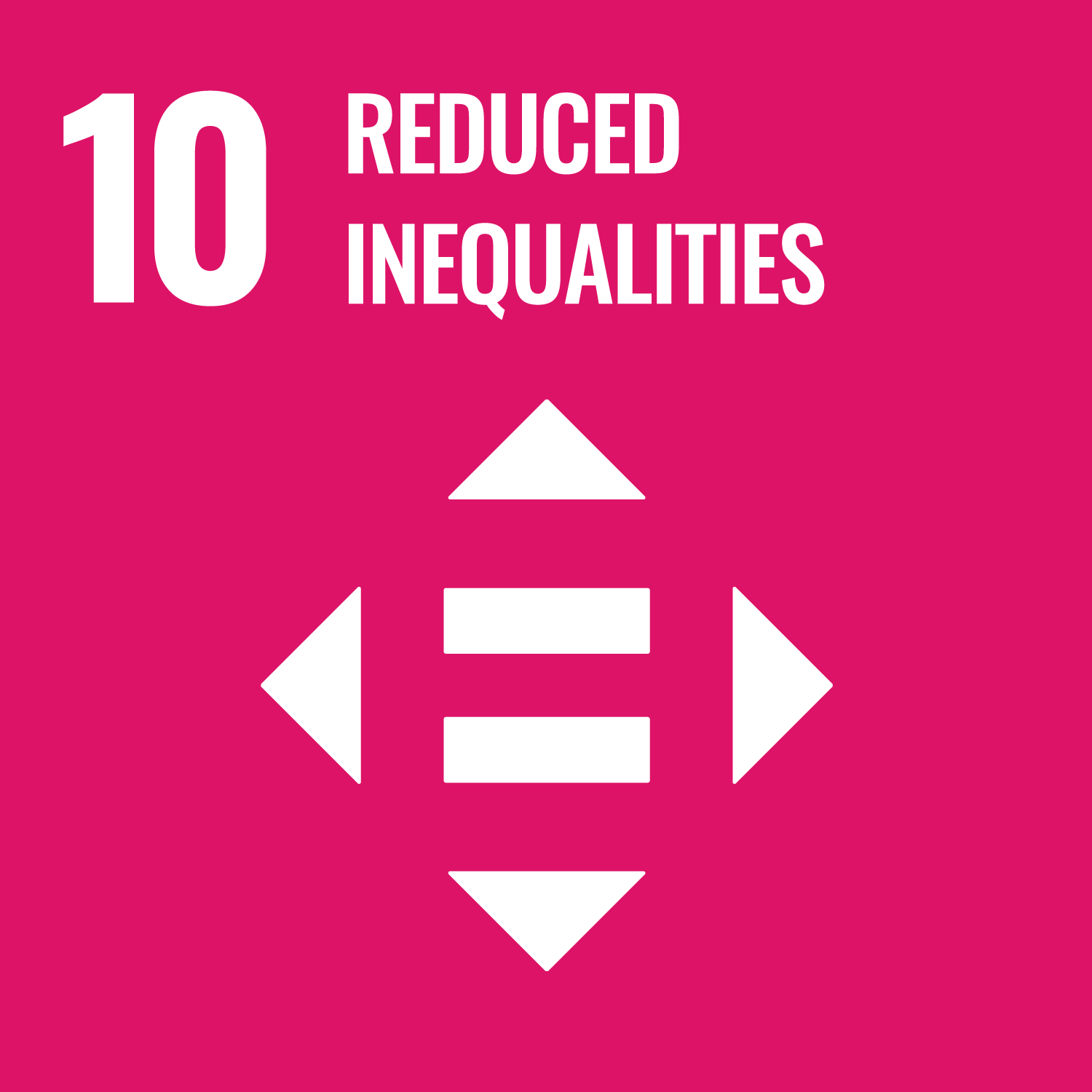
2025.11.21
The Deaflympics, an international sports event for those who are deaf or hard of hearing, will be held in Japan for the first time in November 2025. One of the visions of the event is to realize an inclusive society where "everyone can make the most of their individuality and exert their abilities." This vision is also connected to the Japan International Cooperation Agency (JICA)'s goal of building a peaceful society where everyone can enjoy sports. Observing the people who support this grand event offers a chance for reflection on its significance.
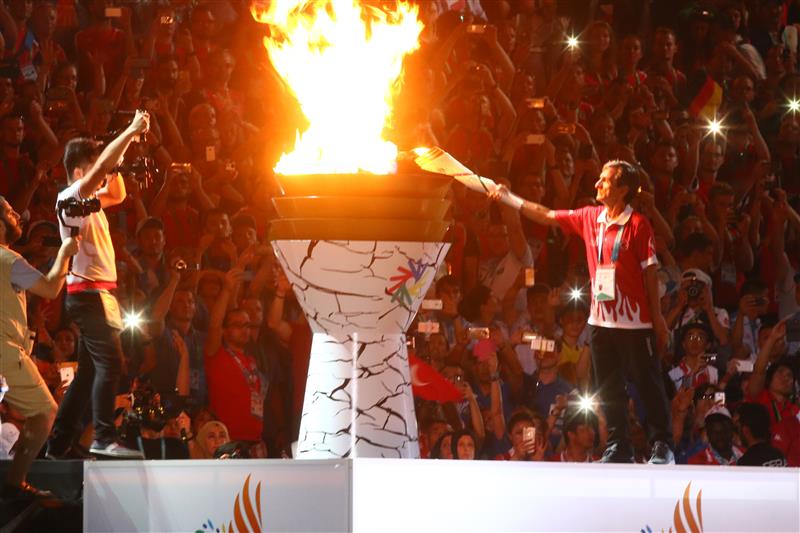
The 23rd Summer Deaflympics, Samsun 2017. (Image provided by Japanese Federation of the Deaf)
In soccer, referees blow whistles while raising flags or hands to signal fouls. Instead of cheering, spectators in the stands wave their hands vigorously to encourage the athletes.
The Deaflympics, a portmanteau of "deaf" and "Olympics," is an international sports event held every four years by the International Committee of Sports for the Deaf (ICSD). Since deaf individuals cannot access information through sound or voice, visual cues and signals are used to ensure "information accessibility."
Because the challenge of being deaf is not visible, hearing individuals often do not fully understand the inconveniences faced by the deaf. This lack of understanding extends to various aspects of daily life. The Deaflympics aims to broaden understanding of the deaf community both domestically and internationally.
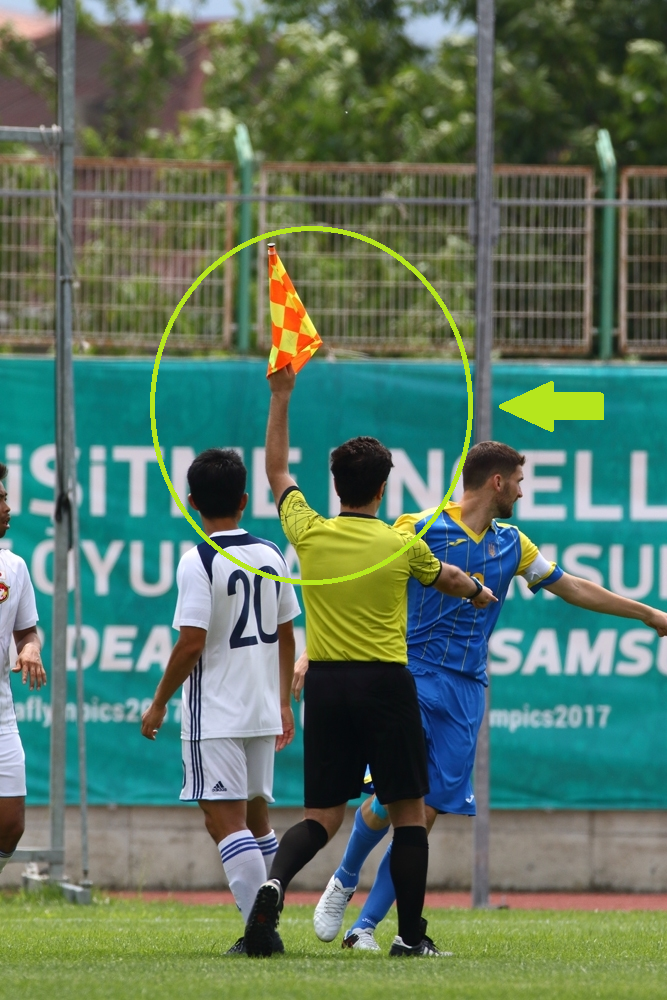
Referees use flags in soccer matches. (Image provided by the Japan Deaf Sports Federation).
The Deaflympics began in Paris in 1924. The 25th "Tokyo 2025 Deaflympics," marks the 100th anniversary of the event. From Nov. 15, 2025, deaf athletes from around 80 countries and regions will gather in Japan to compete in 21 sports over 12 days.
Many people from JICA, which works to promote social participation of people with disabilities in developing countries, are involved in this event. Some accompany athletes from the countries where they were dispatched as Japan Overseas Cooperation Volunteers, serving as interpreters. Others participate as volunteer sign language interpreters, while some watch over the performances of athletes they once coached during their assignments abroad.
Born deaf, Hirose traveled overseas as a backpacker during her student years, deepening her connections with the deaf communities in various countries. Upon learning about the struggles of deaf individuals in developing countries who face unemployment and lack of social recognition, she applied to join the Japan Overseas Cooperation Volunteer with a desire to create a society where deaf and hearing people can coexist without barriers.
From 2013, Hirose spent two and a half years teaching at a school for the deaf in La Romana, Dominican Republic. She noticed that both teachers and parents were under the misconception that deaf children were incapable of achieving anything. This lack of understanding eroded the children's confidence. While working to change this situation, Hirose encouraged the children by telling them, "You don't have to give up on things," and focused on nurturing their independence. years teaching at a school for the deaf in La Romana, Dominican Republic. She noticed that both teachers and parents were under the misconception that deaf children were incapable of achieving anything. This lack of understanding eroded the children's confidence. While working to change this situation, Hirose encouraged the children by telling them, "You don't have to give up on things," and focused on nurturing their independence.
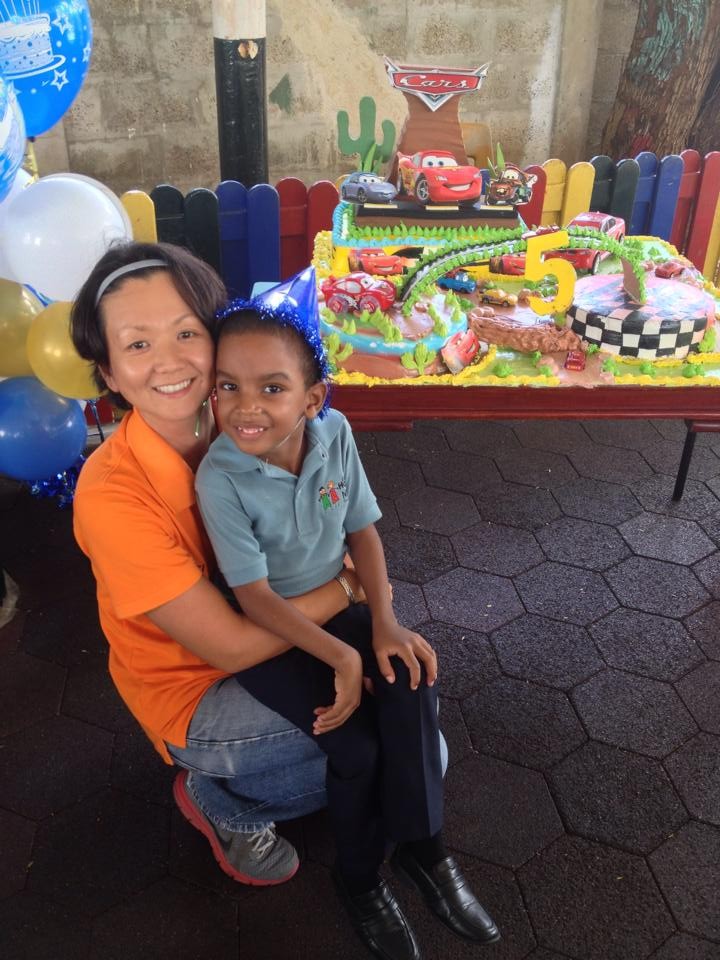
Hirose Meri is seen during her volunteer work in the Dominican Republic. (Photo provided by Hirose Meri)
After returning to Japan, Hirose, along with a deaf friend, established the nonprofit organization "Yes, Deaf Can!" It raises funds through events to provide microloans to deaf individuals aspiring to start their own businesses as a means of supporting their independence. She also launched "Nadeshiko Yoriai," a general incorporated association aimed at promoting sign language.
"When I applied to join the volunteer corps, some people asked, 'Can a deaf person do it?' But I didn't give up. There were hardships, but looking back, I'm filled with gratitude toward JICA for dispatching me. I hope more deaf individuals will follow in my footsteps and join the volunteer corps."
Hirose expressed these thoughts using sign language.
A red light signals "On your mark," a change to yellow means "Set," and the moment it turns green indicates "Go!"
During the Deaflympics, a device known as the "Start Lamp," which signals with lights, plays a crucial role. It is used in track and field events. The developer of this device is Takemi Masahisa, a teacher at the Tokyo Metropolitan Chuo School for the Deaf, and deputy secretary-general of the Japan Deaf Athletics Association.
The inspiration came from a student's tears of frustration. Competing in a race with hearing participants, she couldn't hear the starter's pistol and had no choice but to start running only after seeing the other athletes take off. Witnessing this, Takemi realized, "Sports that only those who can hear can participate in are not fair."
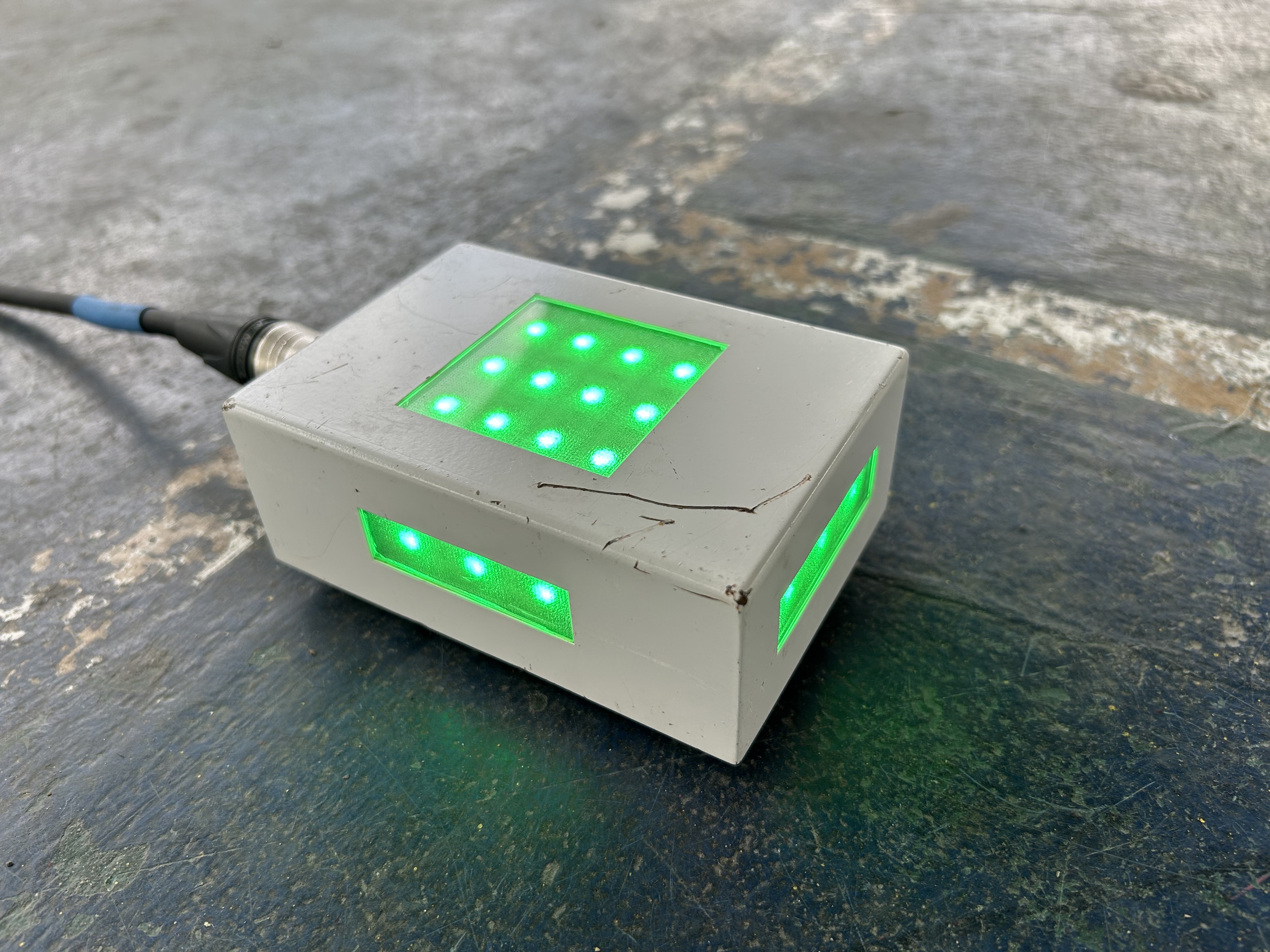
The Start Lamp (Image provided by the Japan Deaf Athletics Association)
"I want the children in the Dominican Republic to use this too!"
In the fall of 2024, Christopher Melenciano, an athlete from the Dominican Republic who participated in an international event held in Tokyo, felt this desire strongly upon seeing the Start Lamp. He was the gold medalist in the men's 200 meters in the previous Deaflympics.
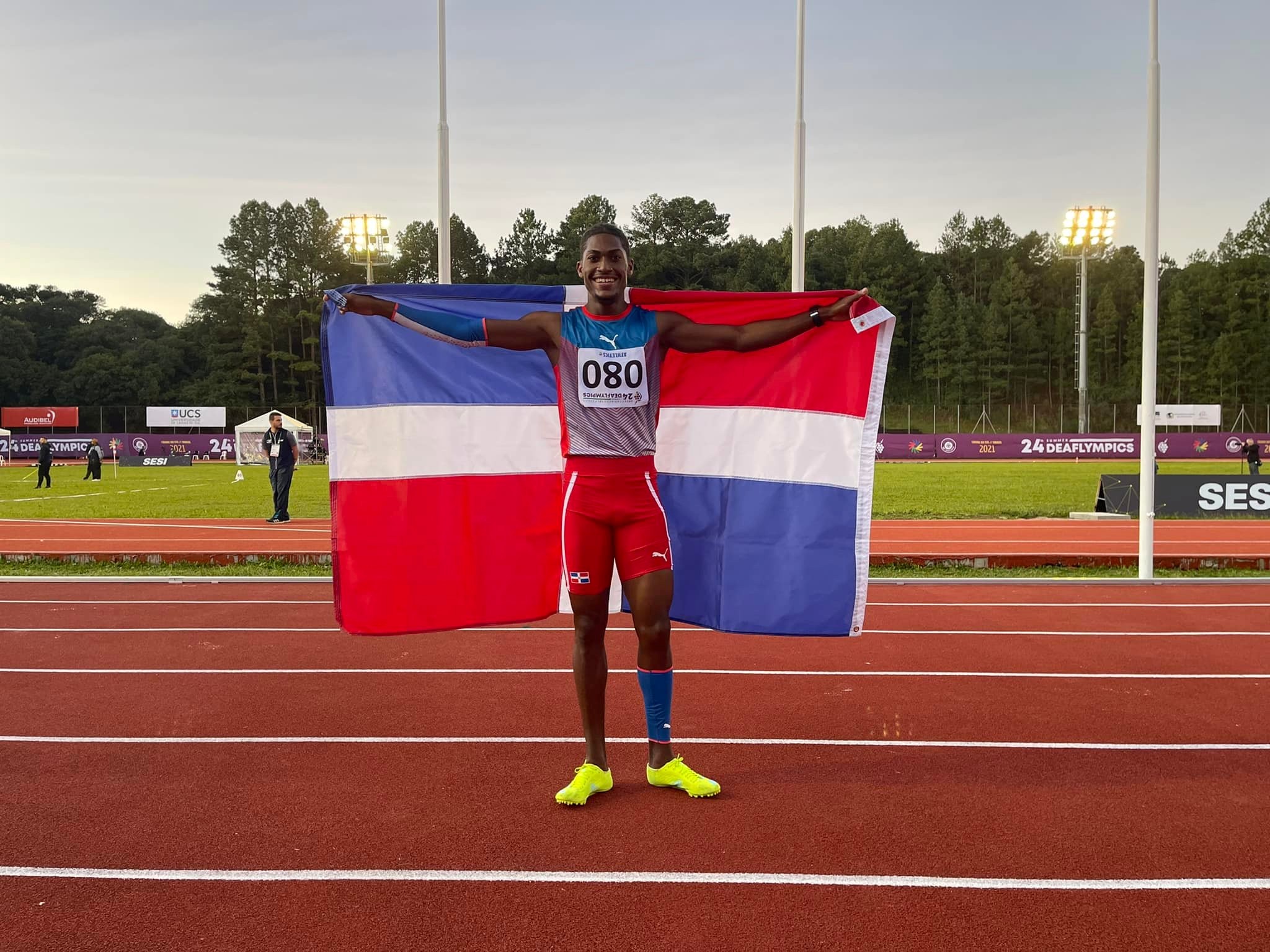
Christopher Melenciano from the Dominican Republic, who participated in the 24th Deaflympics held in Brazil and won the gold medal in the men's 200 meters, poses with a flag. (Photo provided by Hirose Meri)
Spurred by an enthusiastic offer, the association's "Project to connect the world with the Start Lamp " was set into motion. Hirose, who has known Melenciano since her days as a Japan Overseas Cooperation Volunteer, facilitated the connection between the two countries, and JICA provided support. In February 2025, a donation ceremony was held locally, attended by Hirose, Takemi, and Melenciano.
A deaf athletics class was also held at the school for the deaf. Hirose reflects on the experience.
"The moment the Start Lamp lit up, the children took off running all at once, looking like they were truly enjoying themselves. Christopher seemed deeply moved as well. He had often participated in track events with hearing athletes and felt isolated."
Hirose quoted Melenciano as saying, "I want to become a role model and inspire many athletes to follow in my footsteps."
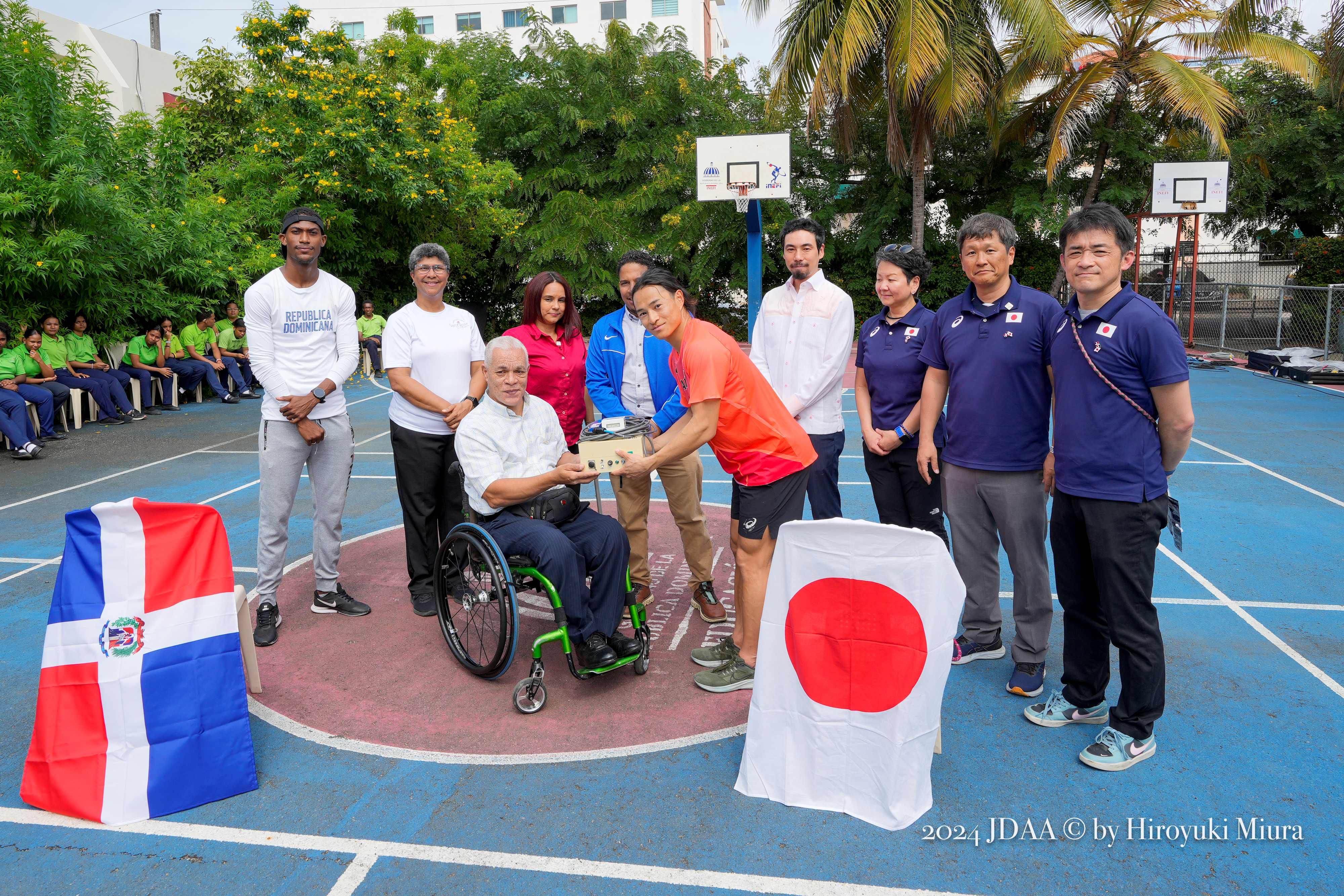
A Start Lamp donation ceremony is held in the Dominican Republic. (Photo provided by the Japan Deaf Athletics Association)
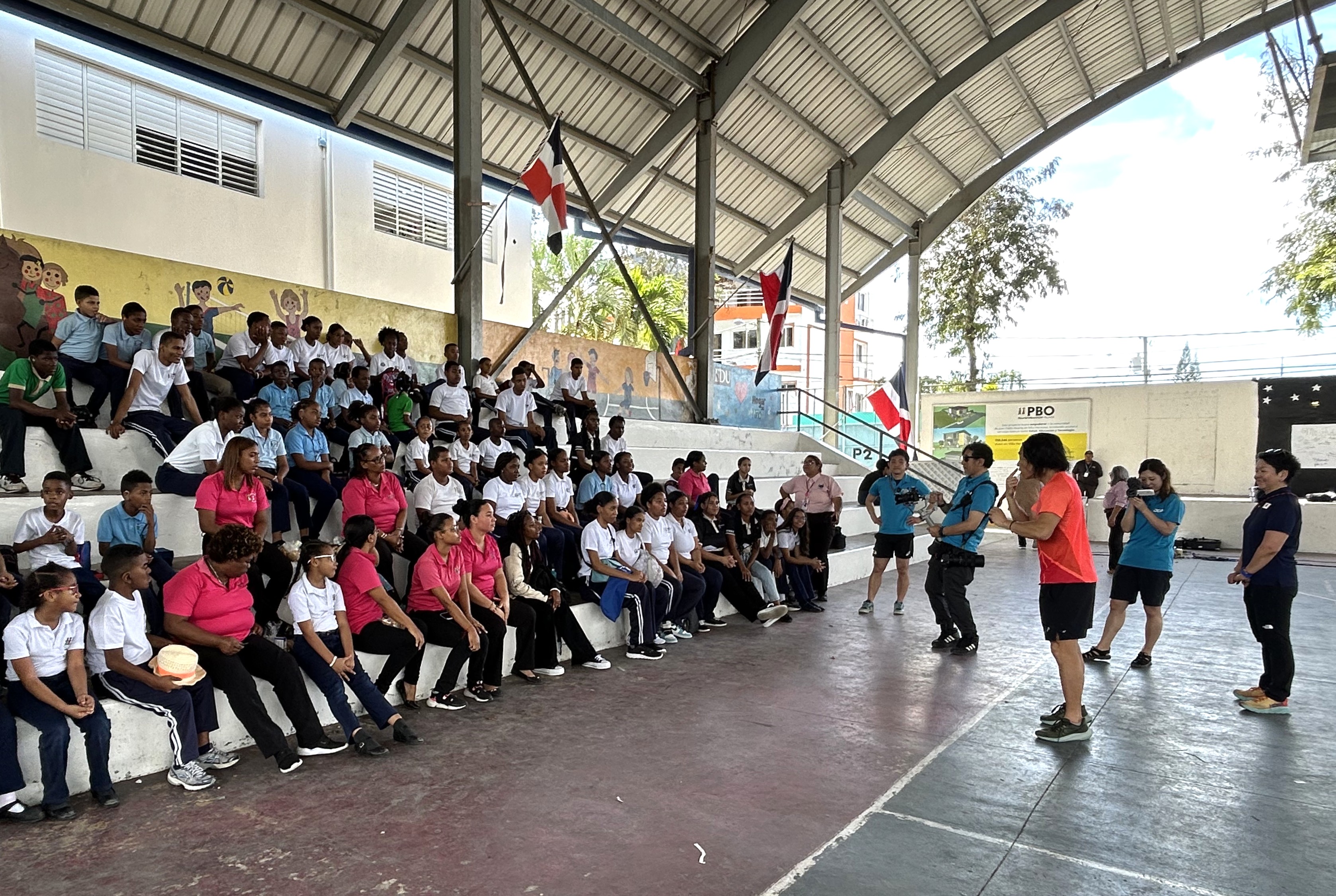
A deaf athletics class is held in the Dominican Republic. (Photo provided by the Japan Deaf Athletics Association)
During the Tokyo 2025 Deaflympics, Hirose will be involved in various tasks.
First, in her role as a board member of the association, Hirose will oversee about 10 international sign language interpreters involved in athletics. While sign language is the primary means of communication for athletes and officials, it varies by country and region, giving international sign language an important role at global events.
Additionally, Hirose is collaborating with the Nippon Foundation's Telecommunications Relay Service, which will temporarily implement a support system during the Deaflympics, utilizing the telephone relay service to accommodate foreign sign languages. Under this initiative, foreign deaf individuals living in Japan support athletes and spectators from their home countries through sign language. For example, an American requester can use a smartphone to communicate with a supporter fluent in American Sign Language, saying, "I want to book a restaurant." The supporter then uses Japanese sign language to relay this request through a sign language interpreting operator of the telephone relay service to make the reservation.
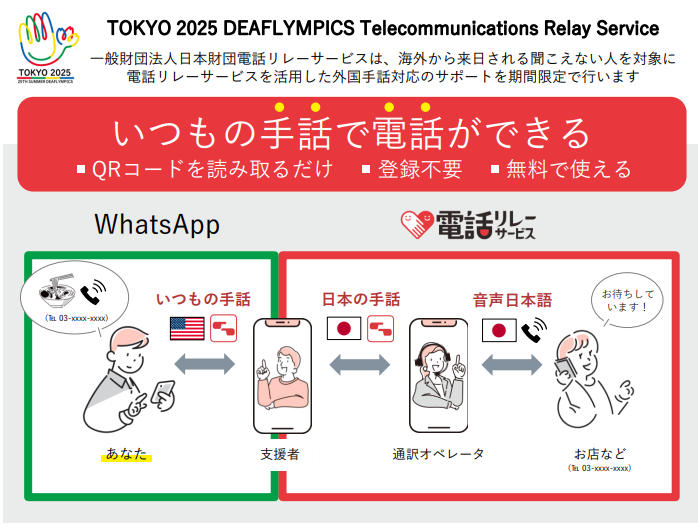
This diagram shows the system for foreign sign language support using the telecommunications relay service during the Tokyo 2025 Deaflympics. (Image provided by the Nippon Foundation's Telecommunications Relay Service)
"Many deaf tourists will visit the Deaflympics. Since Japanese people are skilled in hospitality, we've made preparations to ensure they can enjoy their stay with peace of mind."
According to the World Health Organization (WHO), approximately 430 million people worldwide have some form of hearing impairment. This equates to roughly 1 in 20 people, and it is said roughly 1 in 100 individuals use sign language in daily life.
Through this event, Hirose hopes understanding will broaden with people realizing, "So this is what it means to be deaf." She also hopes that deaf children will gain confidence, thinking, "I want to participate in the Deaflympics in the future" or "I want to do work that takes me abroad."
The Deaflympics connects countries, people, and the hearing with the non-hearing. It embodies the hopes of the world's deaf community, who believe in the power of sports.
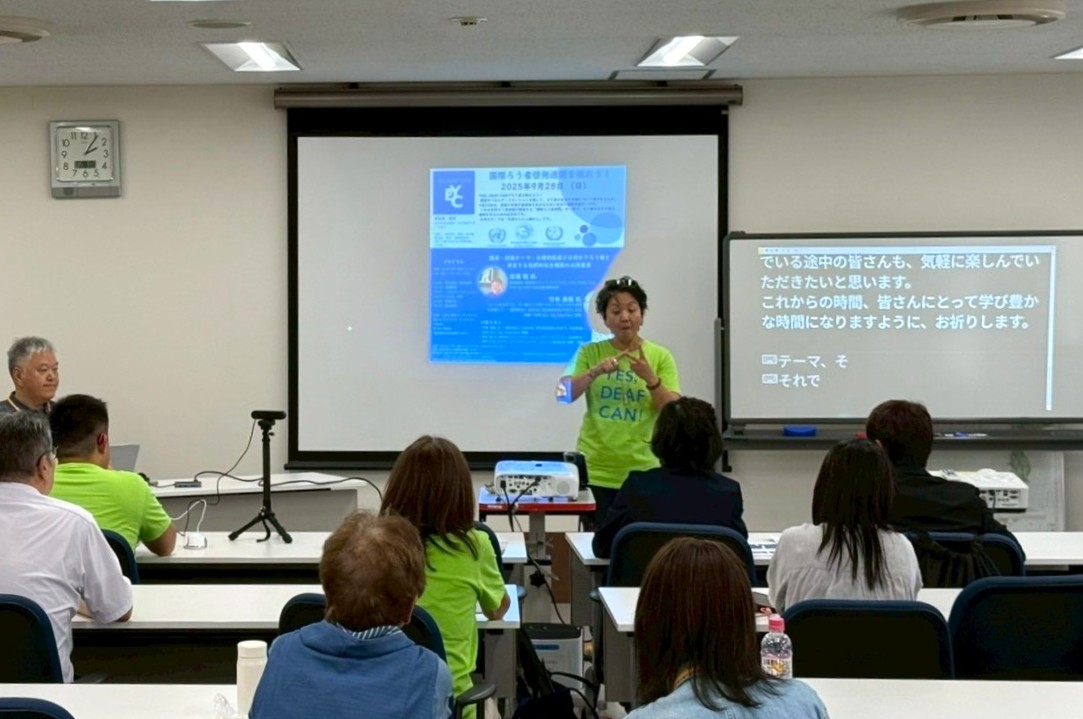
Hirose Meri gives a lecture on sign language and culture. (Photo provided by Hirose Meri)
scroll